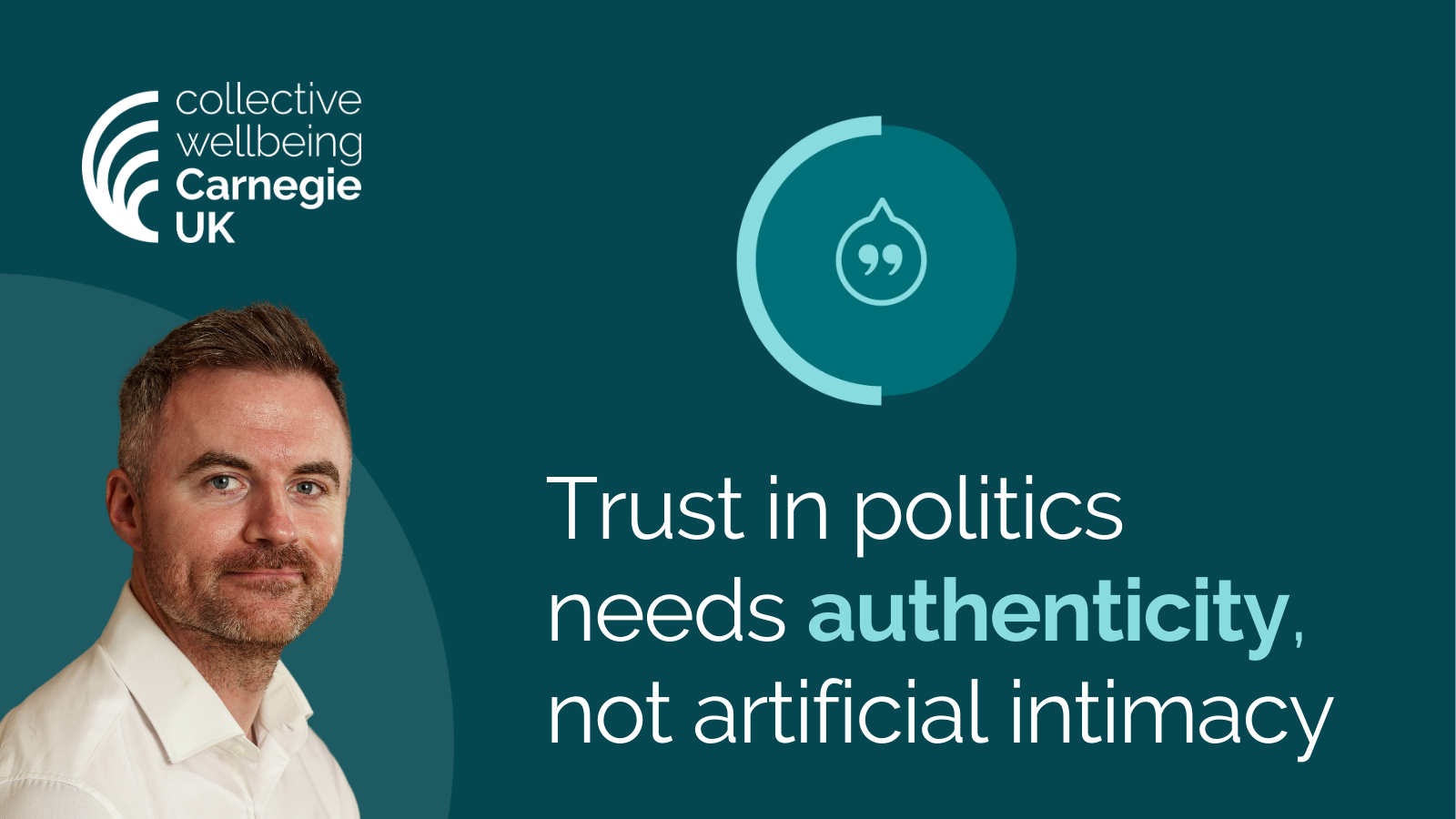Trust in politics needs authenticity, not artificial intimacy

- by Adam Milne, Carnegie UK
- 22 July 2024
- 5 minute read
Like the aftermath of a breakup, general elections are a time to reflect on the highs and lows of what has been and the possibilities of what is to come. Suddenly the world is full of possibilities again. However without trust and connection, democracy and relationships will inevitably struggle.
I feel engaged in politics on a daily basis because of my policy role with Carnegie UK, and particularly down to my work on our Engaging Democracy programme, which looks at a variety of ways to get more people involved in democracy and to better understand how they can bring about change and make a difference to policy and decision making.
However, when I’m not at work, I don’t feel the same level of engagement and I often feel like a spectator of a sport that I just don’t get. Cricket..? No idea what’s going on there. 🤷♂️
It appears I’m not alone. The latest British Social Attitudes survey reveals that “trust and confidence in government are as low as they have ever been”
- 45% of people would ‘almost never’ trust British governments of any party to place the needs of the nation above the interests of their own political party, more than ever before.
- 79% of people believe the present system of governing Britian could be improved ‘quite a lot’ or ‘a great deal’, matching the previous record low in 2019 during the parliamentary stalemate about Brexit.
- 58% of people would ‘almost never’ trust politicians of any party in Britain to tell the truth when they are in a tight corner, similar to the 60% recorded in 2009 in the wake of the MP’s expenses scandal.
I want to prompt some thought about how we can give people more voice and choice in democracy and why that’s important. I know, it’s like someone emphasising the importance of breathing but bear with me, because just as polluted as our air is, democracy is not faring well either. I want to do this by exploring a couple of ideas that relate to the context that many of us and democracy finds itself in.
Politics is everyday life but the arm’s length way we’re asked to engage with it can leave people feeling unseen, unheard and disconnected.
Trust in politics and democracy can’t sustain itself without a strong sense of connection and community.
The first idea… Beyond human scale (as discussed by the world conquering TED-talker, storyteller and researcher, Brené Brown)
This is the idea that technology expands our world beyond what’s easy for us to comprehend and to relate to as individuals, families and communities i.e. human scale.
This is the tension between the impact and pace of technological change which expands our world versus our individual capacity as physical and emotional beings. We are genetically, cognitively and emotionally wired to live at a human scale, but technology pushes us beyond this innate limit. The larger our horizons, the more people are looking for something that is actually nurturing, resulting in expressions of yearning, of loneliness, of seeking connection/community that is a response to technology pushing beyond our human scale.
The second idea… Artificial Intimacy (as discussed by the world-renowned relationship therapist, Esther Perel)
This is the idea that many of our real-life interactions which help give us a sense of validation, who we are and how we relate to others are mimicked online; which give us none of these things in the same way as real life.
No blog worth its salt can fail to mention AI. However, Artificial Intimacy is mostly online, pseudo experiences that give us the feeling of something real but they don’t. With these two ideas combining to create a modern loneliness which often disguises itself as hyper-connectivity.
“I can have 1,000 virtual friends, but nobody to feed my cat, nobody to ask to go and pick up a prescription at the pharmacy, but 1,000 people who are giving me likes and dislikes, and all kinds of things that are now becoming the foundation of my self-esteem. And that’s a different kind of loneliness. It’s not about being physically alone, it’s about being misunderstood, unseen, rejected, ostracised, all of that.” Esther Perel
How can we create an Engaging Democracy?
If voter turnout rates are anything to go by, then the public are increasingly turned off by debate and communications that feel inauthentic or fake. But without the input of citizens, we risk both public services which don’t meet people’s needs and ever more alienated communities. That’s why it’s critical to create spaces and ways for people to genuinely connect with others and the political system. Our democratic processes need to stay within the scales of individuals and communities. Citizens assemblies and the like are a means of engaging people at this level, helping to create a sense of connection and community.
The new PM speaking after the King’s speech seems to recognise the need for change “there would be “no quick fix” and warned against the “snake oil charm of populism”. A change in rhetoric is welcomed but this needs to extend far beyond modest reforms to the House of Lords.
To think about what more can be done, we will be publishing our findings from our Engaging Democracy work in the coming weeks. We’re keen to hear from and work with others to see how we can give more people voice and choice with democracy and increase our democratic wellbeing.
Help us make the case for wellbeing policy
Keep in touch with Carnegie UK’s research and activities. Learn more about ways to get involved with our work.
"*" indicates required fields
